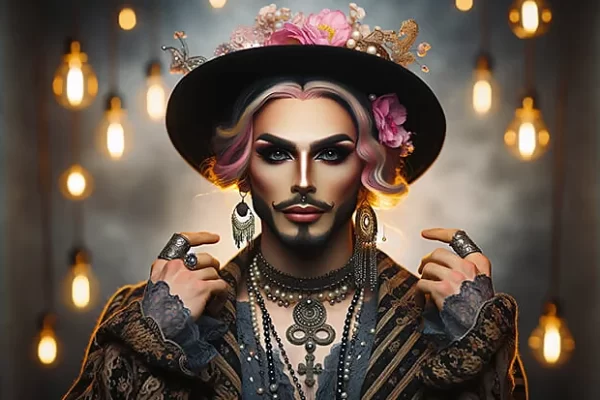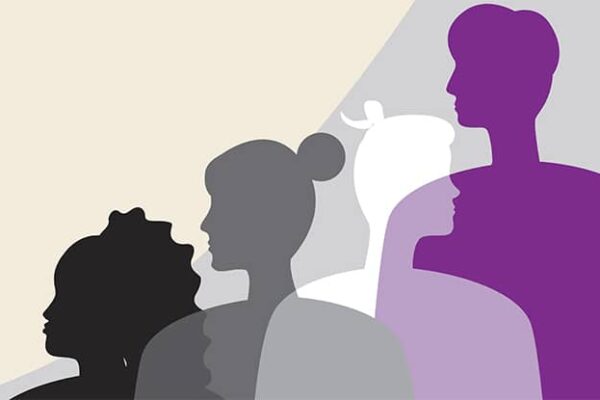In recent years, the concept of a non-binary identity has become more common, but for many people, it remains new and confusing. A non-binary person is someone whose gender self-perception is not confined to “male” or “female” boundaries and can encompass a wide spectrum. Non-binary people do not strictly identify with either the male or female gender, transcending the traditional division into two genders. They feel that their identity is somewhere between or outside these categories.

Non-Binary Identity and Gender Stereotypes
The topic of non-binary identities is especially important in our society, where traditional views on gender remain strong. Many people still believe that gender is solely determined by biological characteristics, even though it is a more complex and personal concept.
Non-binary people often face difficulties such as misunderstanding, judgment, and societal pressure to conform to familiar gender roles. This is why it is essential to discuss and explain non-binary identities—so people can better understand how gender norms and stereotypes can impact the self-perception and psychological well-being of non-binary individuals.
Gender stereotypes are established ideas about how men and women “should” behave, what interests and abilities they should have. For example, men are often attributed traits of strength and decisiveness, while women are associated with gentleness and care. These expectations may seem harmless but actually have a significant influence on how people perceive themselves and others. For a non-binary person, these stereotypes can be a source of pressure and inner conflict, as their self-perception goes beyond these standards. As a result, many non-binary people find it difficult to feel accepted in society and find their place in it.
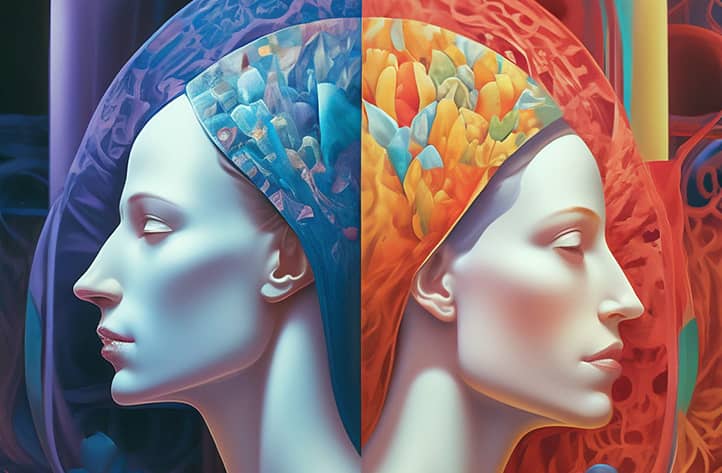
Non-Binary Identity and the Gender Spectrum
To understand how a non-binary identity forms, it is essential to familiarize oneself with the concept of the gender spectrum, which covers far more than the binary roles of “male” and “female.”
What is the Gender Spectrum?
The gender spectrum represents gender as a continuous line or even a multidimensional space, allowing for a wide variety of gender feelings and identities. Gender on this spectrum can be seen as something fluid and individual, not restricted to just two extremes. In practice, this means there are many variations of gender identity, with non-binary identities occupying a unique place.
- Gender identities can range from feeling both male and female simultaneously to having a complete absence of gender self-perception.
- Fluidity – gender self-perception may change depending on time, situation, or inner feelings.
- Agency in Gender Choice – a person has the freedom to determine for themselves who they feel they are, even if it does not align with traditional views of gender.
Non-binary individuals frequently encounter challenges because society as a whole is still unprepared to accept the existence of the gender spectrum and may view such identities as strange or unsettling. However, recognizing the spectrum helps us understand that each person’s gender identity is unique and deserves respect.
Differences Between Binary and Non-Binary Identity
Binary identity is based on the assumption that each person belongs either to the male or female gender. These boundaries are generally fixed and reinforced from childhood. For a non-binary person, this approach limits their self-expression and self-perception because they do not fit into traditional gender categories.
Key differences between binary and non-binary identity:
- Fixity and Flexibility. Binary identities are usually more fixed, while non-binary individuals may feel flexibility or fluidity in their identity.
- Stereotypes. Binary gender roles come with a set of stereotypes about behavior, interests, and appearance. Non-binary people often feel outside these standards.
- Individuality. A non-binary person seeks authenticity based on an internal sense of self rather than societal expectations.
These differences help us realize that, for many people, the binary system is not universal. Non-binary individuals seek ways to express themselves without adhering to conventional categories.
Main Aspects of Non-Binary Identity and Its Manifestations
Non-binary identity can manifest in various ways, and each non-binary person goes through a unique process. There are no clear rules or standards—everyone creates their own understanding and expression of their identity.
Examples of how a non-binary identity can manifest:
- Genderqueer: a person may consciously choose not to identify as male or female, existing outside these categories.
- Bigender: some people may feel both male and female simultaneously or switch between these roles depending on the situation.
- Agender: the absence of a sense of gender, where a person does not consider themselves to belong to any gender category.
- Demigender: partial identification with one of the gender categories while retaining an element of flexibility or neutrality.
- Genderfluidity: identity may change over time and in different circumstances, not being tied to fixed gender roles.
These and other expressions of non-binary identity affirm that each person has the right to freely choose their gender self-perception. For many non-binary individuals, it is important that others not only understand but also respect their right to exist outside traditional stereotypes.
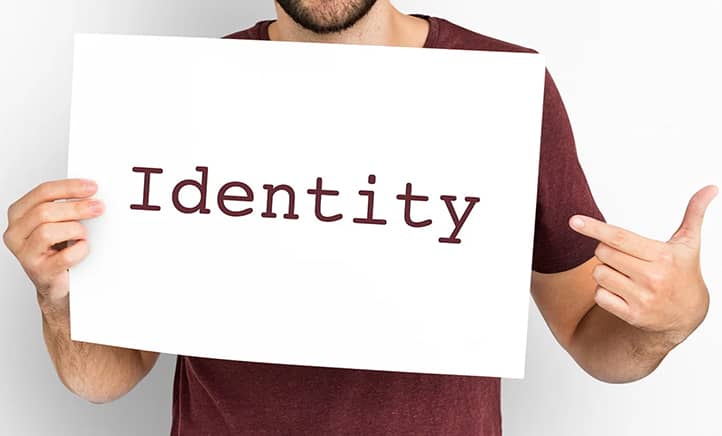
The Psychology of Identity: Formation and Development
The psychology of identity is a field that studies how people perceive and understand themselves, including their gender, and how this process changes over time. The formation of identity involves multiple factors: upbringing, cultural norms, personal experiences, and environmental influences. For a non-binary person, the issue of identity is especially complex, as they often do not fit into conventional categories, which can create both internal and external conflicts.
Formation of Gender Identity: Psychological Perspectives
Gender identity forms under the influence of a range of factors that interact throughout a person’s life. Psychologists highlight several key aspects that influence the development of gender identity, all of which are significant for non-binary people.
- Biological Factors. Although gender is not solely defined by biology, genetic and hormonal factors may influence how a person perceives their body and identity.
- Upbringing and Family Expectations. Family is the first and most significant source of gender roles and norms. From a young age, children are often taught that they are either boys or girls and are expected to follow certain behavior patterns. For a non-binary person who may feel outside these roles, such expectations can be a source of discomfort and inner conflict.
- Social and Cultural Norms. Society dictates many gender stereotypes. For example, based on gender, people may have certain preferences imposed upon them regarding profession, appearance, and lifestyle. A non-binary person, who often does not fit within these frameworks, may face rejection or even condemnation, making it harder to form an authentic identity.
- Personal Perception and Experience. Many non-binary people note that their journey toward understanding their identity was challenging. This journey includes self-analysis, finding suitable terms for self-expression, and possibly reevaluating their life and values. For some, recognizing their non-binary identity may take years.
Factors Influencing Gender Self-Determination
Gender self-determination is a process in which a person realizes and accepts their gender identity. Several factors affect this process, especially relevant for non-binary people.
- Self-Reflection and Inner Work. Many non-binary people go through phases of doubt and reflection as they strive to understand who they are. This process may include seeking information about gender, exploring different identities, and finding those with which they identify.
- Environment and Support. Having support from friends, family, and the community helps non-binary individuals affirm their identity. A supportive environment encourages healthier self-acceptance, while a lack of support may cause anxiety and inner conflict.
- Access to Information and Resources. Non-binary individuals often need information about how others define and express their gender identity. Books, articles, social networks, and LGBTQ+ communities can become valuable resources for those seeking answers.
The Role of Stereotypes in Identity Development
Gender stereotypes have a significant impact on personality development, especially if a person struggles to find their place in society due to not fitting traditional roles. For non-binary individuals, stereotypes can be a serious barrier to self-acceptance and identity formation.
- Conflict of Expectations. Social expectations regarding appearance and behavior can create tension for non-binary individuals. If society expects specific behavior based on gender, this may cause discomfort and a sense of alienation.
- Fear of Rejection. Non-binary people often face judgment and misunderstanding. This frequently leads to a feeling that they do not meet “norms” and are not accepted by society, causing them to hide or suppress their true feelings and identity.
- Impact on Self-Esteem. Constant pressure due to not fitting stereotypes lowers self-esteem. Non-binary people who lack understanding and support may experience internal conflict and feel that there is something “wrong” with them.
Through the process of forming their identity, a non-binary person undergoes a multilayered journey of self-acceptance and liberation from imposed standards. Psychological support and an understanding of the importance of individuality are key elements that help non-binary individuals feel complete and harmonious despite existing stereotypes.
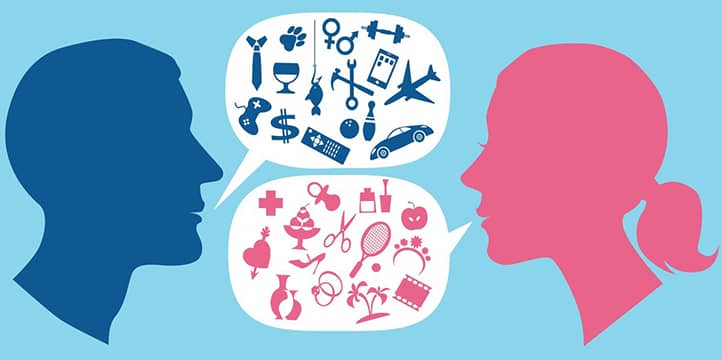
The Impact of Stereotypes on Self-Esteem and Mental Health of Nonbinary Individuals
For nonbinary people, stereotypes based on rigid gender roles can exert considerable pressure, influencing self-esteem and mental health. When society expects everyone to adhere to certain norms, those who don’t fit within these boundaries may experience misunderstanding, stigmatization, and even discrimination. This often leads to internal conflicts, lowers self-confidence, and impacts the overall mental health of nonbinary individuals.
The Impact of Gender Stereotypes on Self-Esteem
Self-esteem is shaped by social expectations, family upbringing, and personal beliefs. For nonbinary individuals, the pressure of gender stereotypes can lead to low self-esteem, as such stereotypes often exclude the possibility of those who do not identify strictly as male or female.
- Comparison with Social Standards. Nonbinary individuals may feel they “don’t fit” into typical images and standards established by society. This can lead to low self-esteem as they feel “different” from others.
- Denial of One’s Identity. When someone is taught from a young age that only two “valid” genders exist, a nonbinary person may experience inner conflict and even shame about their true feelings. Attempting to “conform” to stereotypes, such people may suppress their true self-awareness, which negatively affects self-esteem.
- Social Rejection and Discrimination. Nonbinary people often face criticism and judgment for not fitting traditional gender roles. This heightens feelings of loneliness and isolation, as they may feel misunderstood and unaccepted.
Mental Health and the Pressure of Gender Norms
For many nonbinary individuals, the need to conform to societal expectations and hide their identity creates significant stress, which can negatively impact mental health. Ongoing stress and internal conflicts can lead to various psychological issues.
- Chronic Stress. Due to the constant pressure to conform to stereotypes, nonbinary individuals may experience chronic stress. This manifests as persistent anxiety, worry, and tension, making everyday life and social interactions challenging.
- Anxiety Disorders. The feeling of rejection and social isolation increases the risk of developing anxiety disorders. Nonbinary people may fear judgment from others, leading to social anxiety and the avoidance of public spaces or interactions with unfamiliar people.
- Depression. Low self-esteem, caused by feelings of rejection and loneliness, can lead to depressive states. Nonbinary people, especially those lacking family and close support, may experience despair and a sense of hopelessness.
The Impact of Stereotypes on Self-Acceptance and Body Image
Gender stereotypes affect not only mental health but also the perception of one’s own body. For nonbinary individuals, this often becomes a source of discomfort and anxiety, as traditional expectations regarding appearance may not align with their inner sense of self.
- Body Dysmorphic Disorders. When appearance does not match traditional gender concepts, nonbinary individuals may feel dissatisfied with their bodies. This is expressed in the desire to change their appearance to feel more comfortable and harmonious.
- Difficulty Accepting One’s Body. Due to the pressure of societal standards, nonbinary people may have difficulty accepting their bodies, as it doesn’t always match their inner self-perception. This is especially challenging when others impose opinions on how a person should look.
Ways to Support Nonbinary Individuals in Overcoming Stereotypes
To help nonbinary people successfully overcome the pressure of gender stereotypes, support from both loved ones and society is essential. Psychological help and acceptance significantly increase the self-confidence of nonbinary people and improve their mental health.
- Support from Family and Friends. Understanding and acceptance from close ones contribute to increased self-esteem and confidence. Acceptance helps nonbinary individuals feel part of society, despite its stereotypes.
- Creating Safe Spaces. It’s important for nonbinary people to have access to safe spaces where they can be themselves without fear of judgment. This could include support groups, online communities, or specialized programs.
- Access to Professional Help. Qualified psychologists and psychotherapists who understand the specifics of gender identity can help nonbinary people deal with internal conflicts and improve their mental health by providing tools for working on self-esteem and emotional resilience.
Thus, stereotypes significantly influence the self-esteem and mental health of nonbinary individuals. Overcoming this pressure requires not only the individual’s efforts but also the support of society.
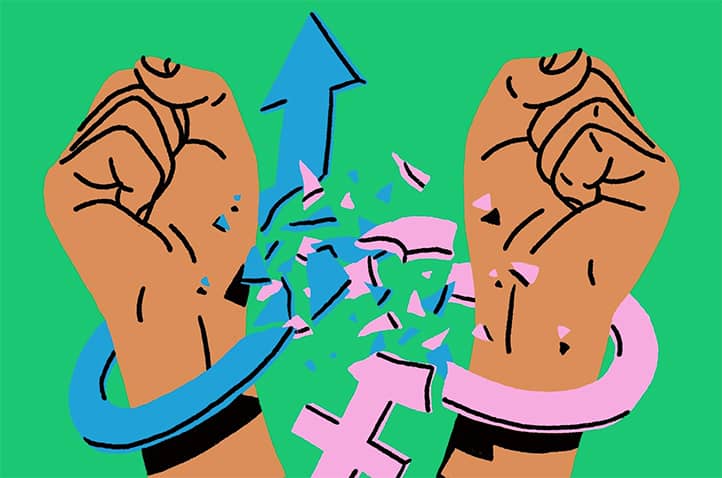
Liberation from Gender Stereotypes: A Psychological Perspective
Psychology plays an essential role in the process of liberating nonbinary individuals from gender stereotypes and societal constraints. This process is vital for forming a healthy self-perception, increasing self-esteem, and improving mental well-being. Psychologists and psychotherapists help nonbinary people find inner harmony and confidence in their identity, despite the pressure of gender norms.
Breaking Away from Established Gender Roles
Liberation from gender stereotypes requires a profound rethinking of established roles and norms entrenched in society. Psychology considers this part of forming a healthy identity, especially for nonbinary people whose identities transcend traditional concepts of gender.
- Reevaluating and Letting Go of Rigid Roles. Traditional society’s gender roles establish specific expectations about how men and women should look and behave. A nonbinary individual may feel internal conflict due to these expectations. Psychologists help people break free from these limitations, teaching them to embrace their identity and reconstruct their world view.
- Accepting One’s Uniqueness. Every person has a unique combination of qualities that don’t fit into rigid gender boundaries. Nonbinary people, once they go through the stage of accepting their uniqueness, gain confidence and free themselves from the need to meet others’ expectations. Psychotherapists help them realize that their uniqueness is a strength, not a weakness.
Developing Independent Self-Esteem
One of the key aspects of liberation from stereotypes for a nonbinary individual is the development of stable self-esteem, independent of society’s opinions. Independent self-esteem enables people to feel more confident and free in expressing their identity.
- Supporting Self-Worth. Psychologists teach nonbinary people to value themselves and their identity, regardless of others’ opinions. This may include mindfulness techniques and practices that help them focus on their true values and desires.
- Working on Negative Beliefs. Many nonbinary people grow up hearing negative remarks about themselves for not conforming to gender stereotypes. Psychologists help reframe these beliefs, replacing them with positive convictions and helping them build self-respect.

The Impact of Psychotherapy on the Development of Non-Binary Identity
Psychotherapy provides non-binary individuals with a safe space to explore their identity and address challenges related to breaking gender stereotypes. Liberation from stereotypes requires not only a re-evaluation of societal norms but also the support of a professional who understands the specifics of non-binary identity.
- Self-Discovery Methods. Methods such as Cognitive Behavioral Therapy, Acceptance and Commitment Therapy, and Gestalt Therapy help non-binary individuals better understand their feelings and values, which may differ from stereotypical gender expectations.
- Therapeutic Space for Identity Acceptance. Psychotherapy offers a safe environment where non-binary people can openly discuss their feelings and fears regarding gender stereotypes. This space allows them to accept and appreciate themselves without concern for societal norms.
- Strengthening Emotional Resilience. Liberating oneself from stereotypes is a long and emotionally challenging process, and the support of a psychologist plays a crucial role. Working through emotions like shame and fear helps non-binary people overcome challenges, building emotional resilience.
Group Therapy and Support Groups
Group therapy and support communities are valuable resources for non-binary individuals, offering an environment where they can connect with others who share similar experiences. This fosters a sense of belonging and makes it easier to overcome challenges related to social isolation.
- Social Acceptance. Interacting with other non-binary people helps combat loneliness and provides support from those who are experiencing similar struggles. This strengthens identity and fosters a more positive self-image.
- Sharing Experiences and Advice. In support groups, non-binary individuals can share experiences, discuss personal coping strategies, and offer useful advice to others. This boosts confidence and helps people adapt to life’s challenges.
- Developing Communication Skills. Participating in group sessions helps people improve communication skills, learn to effectively express their feelings, and find common ground with diverse individuals.
Family Therapy
Family therapy can be extremely helpful for non-binary people, especially if their family struggles to accept their identity or has limited understanding of the topic. A psychologist helps family members find common ground, improve communication, and support the non-binary person.
- Education and Awareness. A psychologist can explain to a non-binary person’s relatives what it means to be non-binary and dispel common myths. This encourages deeper understanding and strengthens family support.
- Addressing Conflicts and Emotional Tension. Family sessions help resolve conflicts stemming from misunderstandings or negative attitudes towards gender identity. The psychologist creates a safe environment for open communication, allowing each family member to express their feelings.
- Strengthening Support and Acceptance. Family support and acceptance are crucial to the well-being of non-binary individuals. A psychologist helps foster support and create an atmosphere where the non-binary person feels loved and accepted.
Psychology as a Tool for Personal Freedom
Liberating oneself from stereotypes not only allows non-binary individuals to be themselves but is also an important step toward freedom and harmony. Psychology views this process as a path to personal wholeness.
- Forming Personal Values. In the therapeutic process, non-binary individuals learn to create their own values and guideposts, free from prejudiced expectations. These values help them feel inner strength and resilience, making them less dependent on others’ opinions.
- Mindful Self-Expression. Those who have freed themselves from stereotypes gain the ability to express their thoughts, feelings, and perspectives without conforming to social norms. This fosters a sense of freedom and expands opportunities for personal growth.
Thus, freeing non-binary individuals from gender stereotypes is a complex and multi-dimensional process that requires internal work, psychological support, and re-evaluation of personal beliefs. Psychology helps these individuals build self-esteem and find freedom in expressing their identity, regardless of societal expectations.
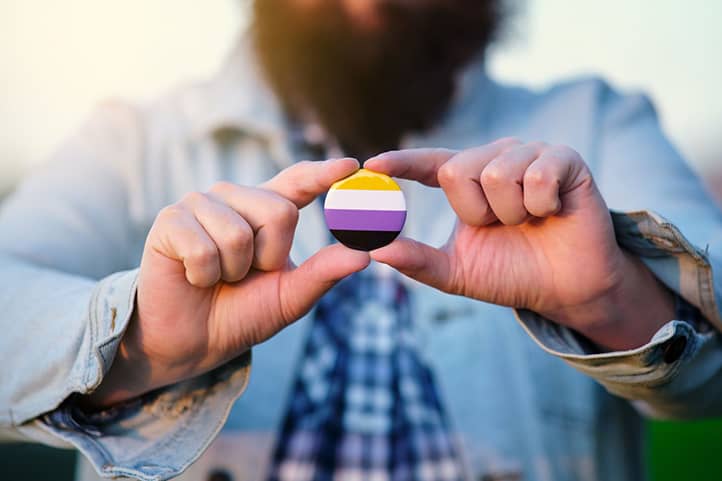
Conclusion
In conclusion, the topic of non-binary identity is an important and complex aspect of modern psychology, reflecting the desire for people to live in harmony with themselves and the world, overcoming rigid gender stereotypes. Non-binary individuals often face pressure and misunderstanding from society, making the self-identification process challenging and often emotionally taxing. A psychological perspective on non-binary identity allows for a deeper understanding of how an identity free from traditional roles is formed and the factors that affect the mental well-being of such individuals.
Understanding that gender exists on a spectrum, rather than as a strict binary category, opens up opportunities for broader integration of non-binary people into society. Self-acceptance, awareness of one’s own uniqueness, and the freedom to express oneself in the most authentic way are immensely significant for their mental health and confidence. Modern psychology supports this acceptance, emphasizing the importance of breaking stereotypes and respecting identity diversity.
However, the journey toward such acceptance is not easy. The pressure of stereotypes can strongly affect the self-esteem and inner well-being of non-binary individuals, creating internal conflicts and leading to various mental health challenges. Stereotypes pervasive in society can create a sense of alienation and loneliness among non-binary people, complicating their social adaptation. In this context, psychological support—whether individual or group—and family and societal support play crucial roles. Psychologists and a supportive environment help non-binary individuals realize their worth, find a sense of belonging, and build confidence.
The process of breaking free from stereotypes and developing a positive identity is long and requires effort from both the individual and society. Psychological approaches such as Acceptance and Commitment Therapy, support groups, and access to online resources create conditions where non-binary individuals can feel accepted and protected. All of this helps people open up, find strength in their uniqueness, and overcome external barriers.
Awareness and acceptance of non-binary individuals are essential steps towards a more open and tolerant society where everyone can be themselves. Psychology plays a key role here, providing the necessary tools for support, self-development, and personal growth. A future in which non-binary people can live freely, expressing their true identity, not only enhances their quality of life but also enriches society as a whole, making it more diverse, flexible, and humane.



